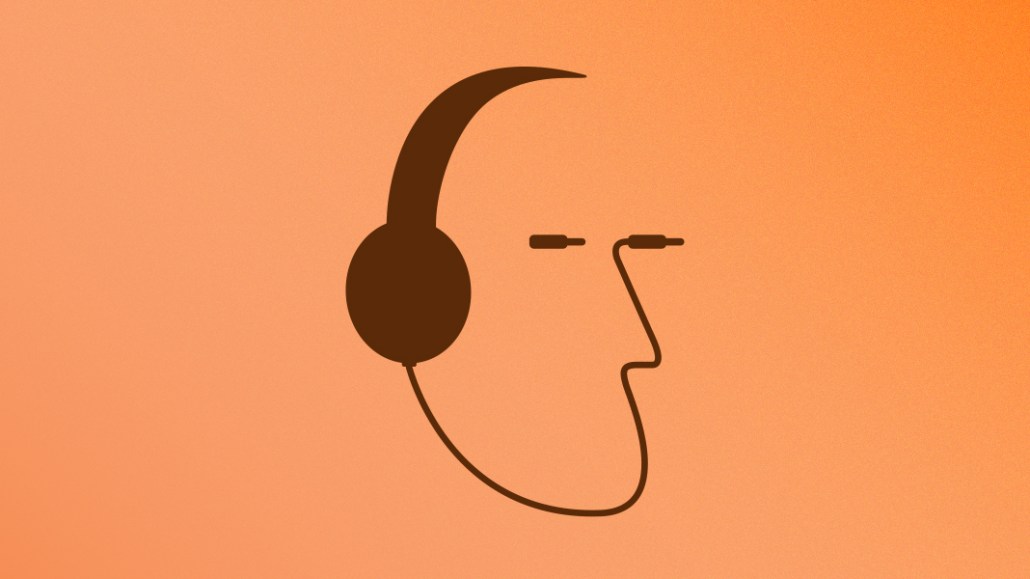Save 50% on a 3-month Digiday+ membership. Ends Dec 5.
‘The industry is demanding it’: Spotify adopts Nielsen Brand Effect for verification on ad platform

Spotify announced Sept. 11 it’s adding Nielsen Brand Effect to its third-party verification suite — another sign the platform is trying to meet advertisers’ demand for proof that it drives sales.
Back in 2011, Spotify got away with saying its audience was “unique” and quite “big,” according to a pitch deck. Now, as the publicly traded company matures, Spotify’s adding another measurement solution from Nielsen — it already uses Nielsen Digital Ad Ratings — so that advertisers can better analyze brand awareness, perception and purchase intent. The company also recognizes the need for verification has become more necessary over the past year.
“When I started [in 2013] our pitch to brands was, ‘Hey, we’re cool and sexy, align with Spotify,’ but the industry has changed so much in the last five years. That’s not good enough anymore,” said Brian Benedik, Spotify’s global head of advertising. “Proving lift, awareness and intent: Those were nice to have a few years ago, but now the industry is demanding it. Erosion of trust and questioning brand safety has really driven the need for all publishers and platforms to provide third-party verification. [Our work is] very much in response to what brands are demanding.”
Spotify has 180 million total monthly active users, about 101 million of whom use its ad-supported version, the company reported in July. Those ads include audio and video ads. Over time, Spotify has added more third-party verification. Nielsen Brand Effect will be available for ads in the U.S., Germany, U.K., Australia, Canada, Japan, Mexico, The Netherlands, Spain and France, for now.
Platforms have been under pressure from advertisers to be more transparent about their ads. Spotify was one of the first streaming music platforms to work with Nielsen and provide advertisers with an independent view of their audiences, said Jessica Hogue, Nielsen’s svp of digital solutions.
Spotify touted Allbirds and Dunkin’ Donuts as successful members of the beta test for Nielsen Brand Effect. Spotify said that Allbirds used Nielsen Brand Lift to analyze a campaign they ran on Spotify in the spring. The shoe maker ran audio, video and display ads on Spotify to U.S. users and reported a 4.7 times lift in brand awareness, 1.5 times lift in favorability and 6 times lift in associating the word “comfort” as a tenant of the brand. Lift, in this case, refers to the difference between people who were exposed to the ad versus those who weren’t. Separately, Dunkin’ Donuts had a 65 percent lift in ad recall in a campaign about its cold brew iced coffee.
Beyond verification, Spotify has been experimenting with its ad experience. It’s running a test in Australia called Active Media where it’s allowing users to skip ads, by choice, instead of blocking ads, a problem Spotify has acknowledged. Benedik said Spotify’s interest in skippable ads in part stemmed from the functionality of the larger ecosystem, where users get to choose what songs to listen to and create playlists. Spotify plans to share insights on that test in the future, Benedik said.
Ad position: web_incontent_pos1
Spotify also has been working to get more small and medium-sized business into its ad network. At the end of last year, Spotify launched a self-serve tool called Ad Studio, which it wants to expand through more integrations.
“It’s the journey to becoming a platform, not just a publisher. Today we work with thousands of brands, but we envision a future where we’re working with hundreds of thousands of brands, and the only way to get there is to provide efficiency to the business,” Benedik said.
More in Marketing

Ulta, Best Buy and Adidas dominate AI holiday shopping mentions
The brands that are seeing the biggest boost from this shift in consumer behavior are some of the biggest retailers.

U.K. retailer Boots leads brand efforts to invest in ad creative’s data layer
For media dollars to make an impact, brands need ad creative that actually hits. More CMOs are investing in pre- and post-flight measurement.
Ad position: web_bfu



